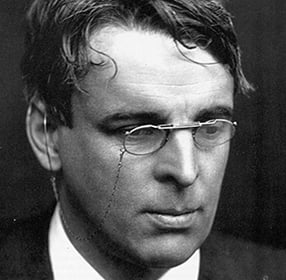The Host of the Air
O’Driscoll drove with a song,
The wild duck and the drake,
From the tall and the tufted weeds
Of the drear Hart Lake.
And he saw how the weeds grew dark
At the coming of night tide,
And he dreamed of the long dim hair
Of Bridget his bride.
He heard while he sang and dreamed
A piper piping away,
And never was piping so sad,
And never was piping so gay.
And he saw young men and young girls
Who danced on a level place
And Bridget his bride among them,
With a sad and a gay face.
The dancers crowded about him,
And many a sweet thing said,
And a young man brought him red wine
And a young girl white bread.
But Bridget drew him by the sleeve,
Away from the merry bands,
To old men playing at cards
With a twinkling of ancient hands.
The bread and the wine had a doom,
For these were the host of the air;
He sat and played in a dream
Of her long dim hair.
He played with the merry old men,
And thought not of evil chance,
Until one bore Bridget his bride
Away from the merry dance.
He bore her away in his arms,
The handsomest young man there,
And his neck and his breast and his arms
Were drowned in her long dim hair.
O’Driscoll scattered the cards
And out of his dream awoke:
Old men and young men and young girls
Were gone like drifting smoke;
But he heard high up in the air
A piper piping away,
And never was piping so sad,
And never was piping so gay.
This poem is in the public domain. Published in Poem-a-Day on October 21, 2023, by the Academy of American Poets.
“The Host of the Air” first appeared under the title “The Stolen Bride” in The Bookman, vol. 5, no. 26 (November, 1893). A shortened and amended version of the poem was later included in W. B. Yeats’s collection The Wind Among the Reeds (Elkin Mathews, 1899). In an epigraph printed above the poem in The Bookman, Yeats writes, “I heard the story on which this ballad is founded from an old woman at Ballysadare, Sligo. She repeated me [sic] a Gaelic poem on the subject, and then translated it to me. I have always regretted not having taken down her words, and as some amends for not having done so, have made this ballad. Anyone who tastes fairy food or drink is glamoured and stolen by the fairies. This is why Bridget sets O’Driscoll to play cards. ‘The folk of the air’ is a Gaelic name for the fairies.” Yeats would later change “the folk of the air” to “the host of the air,” from which the poem’s canonical title is derived. Likewise, he would remove two stanzas from the final version of the poem, emphasizing lyricism at the cost of narrative. As Colin Meir, former reader in English literature at Ulster Polytechnic, writes in The Ballads and Songs of W. B. Yeats: The Anglo-Irish Heritage in Subject and Style (Macmillan, 1974), “The fact that in 1899 Yeats scraped the penultimate stanza shows him changing the nature of the source: he clearly wanted to stress the equivocal ‘lyric emotion’ evoked by the symbolism of the pipe music, not the stark, factual detail of the folk original.”

